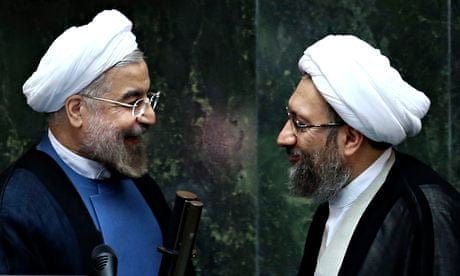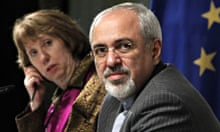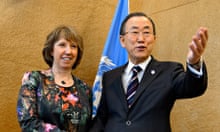The chief of Iran's judiciary has accused the EU of spreading homosexuality and promiscuity in the country after the European parliament warned human rights abuses have continued under Hassan Rouhani's new administration.
Ayatollah Sadeq Larijani, who heads the Islamic Republic's powerful judicial system, defended Tehran's record on human rights on Wednesday, denying it had executed juveniles or imprisoned Bahá'í citizens on the basis of their religious faith.
To the dismay of Iranian leaders, the European parliament passed a resolution last week which condemned "continued, systematic violation of fundamental rights" in Iran and urged diplomats to put a spotlight on human rights in their negotiations with the Islamic republic. Iran has reacted angrily to the declaration, with its foreign ministry describing it as "unfounded and unacceptable".
Last month, the UN secretary general, Ban Ki-moon, made similar accusations, saying Rouhani had done too little to improve rights situation in Iran since taking office as the new president.
Larijani said the resolution was one-sided, counted as interfering in Iran's internal affairs and showed the arrogance of the Europeans towards his country.
"The resolution is worthless and is not worth attention, but it showed the arrogant nature of the westerners under such conditions that they claim serious negotiations with the Islamic republic of Iran," Larijani told judges and senior judiciary officials, according to the semi-official Fars news agency.
"Unfortunately, the Europeans still repeat their cheap remarks against the Iranian people and government and don't pay attention to the documented responses given to them; they have raised one-sided claims in the recent resolution without paying attention to the repeated responses given to them by the Islamic Republic officials."
The resolution particularly infuriated Iranians because it criticised the presidential election that gave Rouhani victory last year, saying it was "not held in accordance with the democratic standards valued by the EU".
The European parliament's resolution highlighted restrictions on freedom of speech in Iran, including the continued closure of the association of Iranian journalists, and condemned "the repression and discrimination on the basis of religion, belief, ethnicity, gender or sexual orientation that persist".
It mentioned the situation of Bahá'ís, who are in the words of the UN's special rapporteur on Iran, Ahmed Shaheed, "the most persecuted religious community" in Iran. Bahá'ís are deprived of many rights such as access to education or the right to own a business, and are often persecuted for their beliefs.
According to the Bahá'í International Community, some 136 Bahá'ís are currently behind bars in Iran on the grounds of their religious beliefs. Those in jail include the Bahá'í couple Faran Hesami and Kamran Rahimian who have been locked up for the past year and half, away from their four-year-old son, Artin Rahimian, who is now being brought up by relatives. The husband and wife were apparently arrested for providing education to other members of the Bahá'í community in Iran who are not allowed to attend university because of their religious affiliation. Seven leaders of the Bahá'í community have also been in prison for the past six years, each serving 20-year jail sentences.
Larijani said: "The Bahá'í faith is made up by the west to interfere with the Muslim countries but despite this no Bahá'í is persecuted in Iran just for being Bahá'í." The judiciary chief said those in prison are convicted of espionage or national security charges. Iran often arrests ordinary Bahá'ís or members of its opposition on vague charges of acting against national security or spreading propaganda against the ruling system.
The ayatollah said: "They [the Europeans] want to normalise promiscuity and forcing homosexuality on us but these behaviours are not compatible with human [nature] and Islamic lifestyle." Two of Larijani's siblings are also powerful figures in the Iranian ruling system. Ali Larijani is the speaker of the parliament and Mohammad Javad Larijani is the secretary-general of the Iranian high council for human rights who often finds himself defending the actions taken under his brother's judiciary system.
On the issue of juvenile executions, documented by human rights groups such as Amnesty and Human Rights Watch, Larijani said these had never happened in the Islamic republic. "In the Islamic Republic, we absolutely have no execution of people under the age of 18 and it's a blatant lie by the European parliament."
Tarja Cronberg, a member of the European parliament's foreign affairs committee who is also the chair of the EU Iran delegation, has defended the resolution.
"The resolution adopted provides a good basis for further dialogue between the EU and Iran. It contains constructive elements which Iran itself has deemed important, including partial sanctions relief, co-operation to combat drug trafficking and terrorism, as well as improving trade relations and expanding exchanges with Europe," she said.
"A European parliament resolution is always a compromise and an outcome of a parliamentary debate. Most importantly, it acknowledges the limited window of opportunity for the EU and Iran."
In reaction to the resolution, a group of Iranian MPs who were planning to visit Strasbourg next week in order to reciprocate a recent EU parliamentary delegation's visit to Tehran, had cancelled their trip. Fars said MPs were also contemplating further retaliatory measures, including Tehran reconsidering its political and economic ties with the EU.







